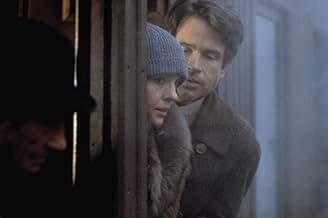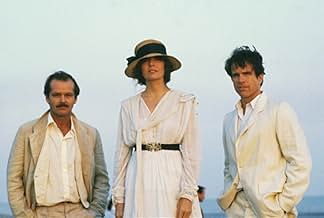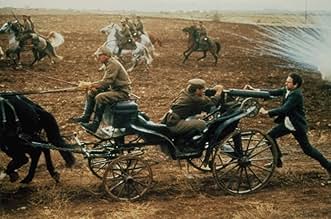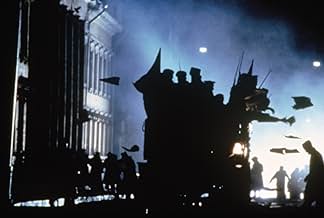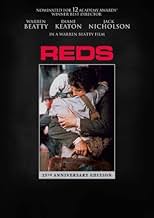VALUTAZIONE IMDb
7,3/10
25.824
LA TUA VALUTAZIONE
Un giornalista americano radicale viene coinvolto nella rivoluzione comunista in Russia e spera di portare il suo spirito e il suo idealismo negli Stati Uniti.Un giornalista americano radicale viene coinvolto nella rivoluzione comunista in Russia e spera di portare il suo spirito e il suo idealismo negli Stati Uniti.Un giornalista americano radicale viene coinvolto nella rivoluzione comunista in Russia e spera di portare il suo spirito e il suo idealismo negli Stati Uniti.
- Regia
- Sceneggiatura
- Star
- Vincitore di 3 Oscar
- 22 vittorie e 37 candidature totali
Eleanor Wilson
- Mrs. Reed
- (as Eleanor D. Wilson)
Recensioni in evidenza
"Reds" is a 200-minute epic masterpiece which deals with left-wing American journalist John Reed (Warren Beatty in an Oscar-nominated performance) and his coverage of the Russian Revolution of the 1910s. Beatty's passion is what carries this ambitious film, which could have easily been a multi-million dollar disaster. His Oscar-winning direction, screenplay, and overall performance carry the film as far as it can possibly go. The top-flight performances by Diane Keaton, Jack Nicholson (both Oscar-nominated), and Maureen Stapleton (Oscar-winning) all add great depth to the performance. Paul Sorvino, Edward Herrmann, and Gene Hackman also make lasting impressions in supporting roles. Overall a great achievement all the way around. 5 stars out of 5.
.
I am old enough to have lived through (probably) three different Americas. These are radically different worlds. It isn't just the mood, styles or state of the economy; its the adoption of a whole cosmology. Religions change under our feet. Family, love, belonging. These things are malleable yet largely beyond our control and we forget what "things were like." Memory always is constructed in terms of the present world.
Always.
So projects like this are necessary. We cannot know who we are unless we remind ourselves who we were.
The ordinary fold here is a romance, folded into grand political actions. Here they are a bit more cerebral than usual, but never getting past the notion of simple justice.
The more unusual and complex fold is that we see a story based on real events and people. Interspersed with that story are interviews of people who were personally involved in the story. These are remarkable, the way they are captured and the way they are edited to overlap with and annotate the story. But much more engaging is that these are enticing people, many with minds and phases that invite us into their faces made warmer and more open by Beatty's camera. I compare this to the "Up" serious and the contrast is astonishing. True, here we want to be informed about the lives of others, and the "Up" goals pretend that the people randomly selected decades ago are remotely worth knowing.
But these folks are. We want more, simply based on their implicit invitation, and we carry ourselves into the narrative more forcefully, sort of like the characters do. This is folding doing its job and doing it well. They remember. I remember, and therefore am.
Ted's Evaluation -- 3 of 3: Worth watching.
I am old enough to have lived through (probably) three different Americas. These are radically different worlds. It isn't just the mood, styles or state of the economy; its the adoption of a whole cosmology. Religions change under our feet. Family, love, belonging. These things are malleable yet largely beyond our control and we forget what "things were like." Memory always is constructed in terms of the present world.
Always.
So projects like this are necessary. We cannot know who we are unless we remind ourselves who we were.
The ordinary fold here is a romance, folded into grand political actions. Here they are a bit more cerebral than usual, but never getting past the notion of simple justice.
The more unusual and complex fold is that we see a story based on real events and people. Interspersed with that story are interviews of people who were personally involved in the story. These are remarkable, the way they are captured and the way they are edited to overlap with and annotate the story. But much more engaging is that these are enticing people, many with minds and phases that invite us into their faces made warmer and more open by Beatty's camera. I compare this to the "Up" serious and the contrast is astonishing. True, here we want to be informed about the lives of others, and the "Up" goals pretend that the people randomly selected decades ago are remotely worth knowing.
But these folks are. We want more, simply based on their implicit invitation, and we carry ourselves into the narrative more forcefully, sort of like the characters do. This is folding doing its job and doing it well. They remember. I remember, and therefore am.
Ted's Evaluation -- 3 of 3: Worth watching.
'Reds' is one of the finest American films ever made- it is the film that Beatty worked towards from 'Bonnie & Clyde'; tellingly he would not make another film until the excerable 'Ishtar' (which was probably more fun to make than watch).
This film feels like a cross between David Lean ('Dr Zhivago' & 'Lawrence of Arabia' from his oeuvre) and Oliver Stone (in 'Nixon' mode). As with 'Bonnie & Clyde' the right music has been picked for the soundtrack- 'The Internationale' & Keaton's take of '...In my Yard' standout (though the score is taken from Sondheim, with contributions by 'Graduate'-composer Dave Gruisin). The film is brilliantly shot by the great Vittorio Storaro- who uses the same huge talent as he did on Bertolucci's 'Il Conformista' & Coppola's 'Apocalypse Now Redux'. Trevor Griffiths co-wrote this film- though there were contributions from a variety of historians- most notably Robert Rosenstone.
Fans of the film should consult Rosenstone's biography of John Reed ('Romantic Revolutionary') and his chapter on his involvement with and objections to elements in 'Reds' in the book 'Visions of the Past'. This Biopic is an interpretation of a life- as with films like 'Patton' it takes a rather small period of the protaganists total life experience- running from roughly 1914 to Reed's death from typhus in 1920. The film charts Reed's major experiences- his coverage of the First World War and the Mexican War of 1916 is shown- though the major achievments are his ventures into the complexities of American Socialism and American-Communism and his eventual experience in Russia/Soviet Union. The main aspect, the stalwart element throughout the film is his love affair with Louise Bryant- which is where the film begins and ends. Rosenstone believes this may have been a concession to Hollywood audience- but I think it puts the human and greater-backdrop into context.
'Visions of the Past' censures much of Beatty's "twists of truth" and the filmic conventions of compression and dramatic-symbolistic interpretation. This is not a documentary and this is not the actual John Reed. This is a biopic film, starring Warren Beatty playing 'John Reed'. If you want to read about the real thing- try 'Romantic Revolutionary' and Reed's masterpiece 'Ten Days That Shook the World' (which, ironically, came in for criticism regarding Reed's fictionalisation of the events of the Russian Revolution!- see the introduction to the Penguin edition by AJP Taylor). Remember historians have a vested interest in their interpretation- which by placing into lineal order in a history (non-fiction) book they are placing into a narrative form.
Beatty and Keaton are great in this film- with brilliant support from Gene Hackman,Jack Nicholson, Paul Sorvino & Maureen Stapleton. We see the John Reed on-screen move from Jack Reed journalist to John Reed idealist- the only American to be buried within the walls of the Kremlin.
Various anti-commies have objected to this film as it depicts Communism- well, at the time, this development from Marx/Engels 1848 Manifesto seemed liberating. Many intellectuals pondered on a new collective, non-Capitalist world- which was sadly a utopia that was unattainable. The Russian experiment failed- Beatty alludes to the flaws and Stalinism in the speech which the Party retranslate towards their own ends towards the end of the film. The Russian Revolution was an ideal- the workers of the world uniting- which considering the treatement meted out by the likes of Henry Ford was a good thing. This message is still relevant- as 'free market Capitalism' means market dominance for Superpowers, poverty for others- the persistence of a constant underclass and the eradication of Union Rights. There are as many flawed ethics to Capitalism as Communism- the arms trade (Reagan/Bush to Hussain, the US-sponsored coup in Chile-Cambodia-El Salvador- a policy which continues up to the failed one last week in Venezuala). Beatty takes the socialist ideals which 'Shampoo' alluded to and which he continued in the satirical 'Bulworth'.
Unlike Attenborough's 'Gandhi', this is not a biopic that is too reverent to its focus- many times Reed is shown to be a clown and it is Bryant's character who undergoes the vaster change- giving this film a strong feminist element. The other stroke of genius is the use of the witnesses- who provide a commentary on the film that sometimes contradict each other- alluding to a multiplicity of truths that overlap (as with Stone's alternate scenarios in 'JFK' & 'Nixon'- they themselves are not true but point out that the truth is relative and the accepted historist take may not be any more "real").
The Oscar people exhibited their usual poor taste again- choosing the yawnworthy 'Chariots of Fire' over this for best picture (well, the year before they chose 'Ordinary People' over 'Raging Bull'- and to this day mediocrity wins that coveted award: 'Forrest Gump', 'Schindler's List', 'Gladiator', 'Braveheart', 'Titanic'). This film has an epic scope- that the worthy Oscar winner 'The English Patient' also exhibited- though both show influence from David Lean. This was a time when Hollywood had ambition and made some great films that may not have set the box-office on fire a la 'Jaws' or 'Star Wars' but made some great works for posterity: 'The Deer Hunter', 'New York New York', 'Raging Bull', 'Heavens Gate' and this. 'Reds' is a masterpiece that should be seen by everyone and desrves to take its place alongside classic works by directors such as John Ford, Howard Hawks and Orson Welles.
This film feels like a cross between David Lean ('Dr Zhivago' & 'Lawrence of Arabia' from his oeuvre) and Oliver Stone (in 'Nixon' mode). As with 'Bonnie & Clyde' the right music has been picked for the soundtrack- 'The Internationale' & Keaton's take of '...In my Yard' standout (though the score is taken from Sondheim, with contributions by 'Graduate'-composer Dave Gruisin). The film is brilliantly shot by the great Vittorio Storaro- who uses the same huge talent as he did on Bertolucci's 'Il Conformista' & Coppola's 'Apocalypse Now Redux'. Trevor Griffiths co-wrote this film- though there were contributions from a variety of historians- most notably Robert Rosenstone.
Fans of the film should consult Rosenstone's biography of John Reed ('Romantic Revolutionary') and his chapter on his involvement with and objections to elements in 'Reds' in the book 'Visions of the Past'. This Biopic is an interpretation of a life- as with films like 'Patton' it takes a rather small period of the protaganists total life experience- running from roughly 1914 to Reed's death from typhus in 1920. The film charts Reed's major experiences- his coverage of the First World War and the Mexican War of 1916 is shown- though the major achievments are his ventures into the complexities of American Socialism and American-Communism and his eventual experience in Russia/Soviet Union. The main aspect, the stalwart element throughout the film is his love affair with Louise Bryant- which is where the film begins and ends. Rosenstone believes this may have been a concession to Hollywood audience- but I think it puts the human and greater-backdrop into context.
'Visions of the Past' censures much of Beatty's "twists of truth" and the filmic conventions of compression and dramatic-symbolistic interpretation. This is not a documentary and this is not the actual John Reed. This is a biopic film, starring Warren Beatty playing 'John Reed'. If you want to read about the real thing- try 'Romantic Revolutionary' and Reed's masterpiece 'Ten Days That Shook the World' (which, ironically, came in for criticism regarding Reed's fictionalisation of the events of the Russian Revolution!- see the introduction to the Penguin edition by AJP Taylor). Remember historians have a vested interest in their interpretation- which by placing into lineal order in a history (non-fiction) book they are placing into a narrative form.
Beatty and Keaton are great in this film- with brilliant support from Gene Hackman,Jack Nicholson, Paul Sorvino & Maureen Stapleton. We see the John Reed on-screen move from Jack Reed journalist to John Reed idealist- the only American to be buried within the walls of the Kremlin.
Various anti-commies have objected to this film as it depicts Communism- well, at the time, this development from Marx/Engels 1848 Manifesto seemed liberating. Many intellectuals pondered on a new collective, non-Capitalist world- which was sadly a utopia that was unattainable. The Russian experiment failed- Beatty alludes to the flaws and Stalinism in the speech which the Party retranslate towards their own ends towards the end of the film. The Russian Revolution was an ideal- the workers of the world uniting- which considering the treatement meted out by the likes of Henry Ford was a good thing. This message is still relevant- as 'free market Capitalism' means market dominance for Superpowers, poverty for others- the persistence of a constant underclass and the eradication of Union Rights. There are as many flawed ethics to Capitalism as Communism- the arms trade (Reagan/Bush to Hussain, the US-sponsored coup in Chile-Cambodia-El Salvador- a policy which continues up to the failed one last week in Venezuala). Beatty takes the socialist ideals which 'Shampoo' alluded to and which he continued in the satirical 'Bulworth'.
Unlike Attenborough's 'Gandhi', this is not a biopic that is too reverent to its focus- many times Reed is shown to be a clown and it is Bryant's character who undergoes the vaster change- giving this film a strong feminist element. The other stroke of genius is the use of the witnesses- who provide a commentary on the film that sometimes contradict each other- alluding to a multiplicity of truths that overlap (as with Stone's alternate scenarios in 'JFK' & 'Nixon'- they themselves are not true but point out that the truth is relative and the accepted historist take may not be any more "real").
The Oscar people exhibited their usual poor taste again- choosing the yawnworthy 'Chariots of Fire' over this for best picture (well, the year before they chose 'Ordinary People' over 'Raging Bull'- and to this day mediocrity wins that coveted award: 'Forrest Gump', 'Schindler's List', 'Gladiator', 'Braveheart', 'Titanic'). This film has an epic scope- that the worthy Oscar winner 'The English Patient' also exhibited- though both show influence from David Lean. This was a time when Hollywood had ambition and made some great films that may not have set the box-office on fire a la 'Jaws' or 'Star Wars' but made some great works for posterity: 'The Deer Hunter', 'New York New York', 'Raging Bull', 'Heavens Gate' and this. 'Reds' is a masterpiece that should be seen by everyone and desrves to take its place alongside classic works by directors such as John Ford, Howard Hawks and Orson Welles.
An engrossing film about John Reed's love affair with Louise Bryant and his struggles in the midst of the Russian Revolution. There are great performances from Beatty, Keaton, Nicholson (excellent as Eugene O'Neill) and Stapelton in her Oscar winning performance as Emma Goldman. Beatty's precision and timing in the use of his camera in this picture is a superb achievement. There is a touch of David Lean in director Beatty in this film. The color, the editing, the sound. All of those important filmic elements are at play here in great form. Beatty won the Best Director Oscar, but lost the Best Picture award to Chariots of Fire.
Warren Beatty's magnum opus Reds was presented as a revival film official selection of the New York Film Festival 2006 to celebrate the twenty-fifth anniversary of its original appearance.
Reds's greatest virtue may be that it's grand, without being pompous, film-making. It's a film that takes some pride in being big and turbulent and unruly. It's important, but it's not tidy. It's in part certainly very much about ideology, but it avoids sharp, well-honed edges or large hard-etched "points." John Reed (played by the film's impresario, its sole producer, director, co-author, and star, Warren Beatty) was a man who happened to be able to write a first-hand account of the Bolshevik revolution, a long-time bestseller called Ten Days That Shook the World. At that time early in the twentieth century in America Reed arguably was a central figure, if only in the sense that during his time in Greenwich Village he managed to be (as he wanted to be) consistently at the center of things American political and cultural when he wasn't in Russia (which was pretty central then too). Roger Ebert thinks the movie "never succeeds in convincing us that the feuds between the American socialist parties were much more than personality conflict and ego-bruisings" (that may depend on how hard we need to be convinced to begin with), but we do care about Reds (Ebert thinks) as "a traditional Hollywood romantic epic, a love story written on the canvas of history, as they used to say in the ads it is the thinking man's Doctor Zhivago, told from the other side, of course." What about the choice of Warren Beatty and Diane Keaton as the lovers? Initially that may seem an odd and chemistry-poor decision. (I'm not sure I overcome that impression.) But arguably the film takes long enough with each of its main characters to make them into rounded people, complex enough to be attractive to others and to each other. Beatty uses the romance to hold the story together, and in doing so, he follows a conventional enough scheme. Reds stands out from other American mainstream products and for all its maverick central force, it remains that in its attempt to deal seriously with complex socio-political events during a turbulent period, and to approach them in an open-minded way. Beatty weaves other significant characters into the fabric of his drama, notably the leftist activist Emma Goldman (Maureen Stapleton, who got the Oscar for Best Supporting Actress) and the radical editor Max Eastman (Edward Herrmann), who are members of the same political-intellectual salon into which he brings Louise, as is the playwright Eugene O'Neill (Jack Nicholson).
Beatty's filmic recreation of John Reed is good in not being too serious or too idealized: in having a silly side Beatty's Reed perhaps has something of himself. Reed's lover Louise Bryant (Keaton), though originally a bourgeois lady from Portland, is similarly rounded; she's led by her relationship to Reed to develop other facets and strengths, and further enlarged as a personality through the way the film depicts her long affair with the alcoholic O'Neill, played by a toned-down but emotionally potent Nicholson. His discontent and negative energy are disturbing. Personalities anchor the film; but in some of the political debates and adventures one loses track and forgets why Reed is somewhere in Russia. He is at the center of things. But why he is where he is otherwise at certain moments is uncertain. In its ambition to keep juggling the many balls of major personalities and major political currents and historical events, Reds loses some of its narrative clarity and momentum over time. Complex political and historical currents are tracked, but the emotional trajectory loses its momentum. Nonetheless the film develops sweep in its length of three and a quarter hours. One walks out convinced that the material was complex enough to be worthy of such length, even if Beatty and his co-writer Trevor Griffiths could not whip it all into shape.
Whether it's all worth it on the stage of international cinema or not, this is a film of historical interest as a great independent project, begun logically in the Seventies, but completed right in the middle of Hollywood by an American intelligent and engaged enough to be star, director, writer, and producer, to raise $35 million to do it, and to make more or less the movie he wanted to make right in the middle, so to speak, of a wave of conservatism and yuppiedom, in the early Eighties, when people were thinking about making money and making it, when Ronald Reagon was President of the United States. What more appropriate time to reexamine this achievement than in the middle of the second term of George Bush II? No doubt Beatty took on this story because he was interested in a time in America when it was rife with left-wing politics. But he is realistic, and he made a Hollywood movie, with big stars and romance. And that's what it is and remains. But one can't imagine anybody else making it, and that's what makes it worth revisiting. Warren Beatty is an admirable maverick in the clone-heavy world of Southern California media-moguldom. He's a real person. And this is his great performance as a person and as an artist. I first saw it with a group of real communists. "We're "reds," they said as we walked out. The theater staff looked impressed. I was bowled over by their pride. Not everyone watches this film as a "traditional Hollywood romantic epic." It would never have been made if that were all it was. Its grandeur and ambition are still moving and it must not be forgotten. For a more pungent treatment of a political and social theme starring Beatty, consider Hal Ashby's 1975 Shampoo.
Reds's greatest virtue may be that it's grand, without being pompous, film-making. It's a film that takes some pride in being big and turbulent and unruly. It's important, but it's not tidy. It's in part certainly very much about ideology, but it avoids sharp, well-honed edges or large hard-etched "points." John Reed (played by the film's impresario, its sole producer, director, co-author, and star, Warren Beatty) was a man who happened to be able to write a first-hand account of the Bolshevik revolution, a long-time bestseller called Ten Days That Shook the World. At that time early in the twentieth century in America Reed arguably was a central figure, if only in the sense that during his time in Greenwich Village he managed to be (as he wanted to be) consistently at the center of things American political and cultural when he wasn't in Russia (which was pretty central then too). Roger Ebert thinks the movie "never succeeds in convincing us that the feuds between the American socialist parties were much more than personality conflict and ego-bruisings" (that may depend on how hard we need to be convinced to begin with), but we do care about Reds (Ebert thinks) as "a traditional Hollywood romantic epic, a love story written on the canvas of history, as they used to say in the ads it is the thinking man's Doctor Zhivago, told from the other side, of course." What about the choice of Warren Beatty and Diane Keaton as the lovers? Initially that may seem an odd and chemistry-poor decision. (I'm not sure I overcome that impression.) But arguably the film takes long enough with each of its main characters to make them into rounded people, complex enough to be attractive to others and to each other. Beatty uses the romance to hold the story together, and in doing so, he follows a conventional enough scheme. Reds stands out from other American mainstream products and for all its maverick central force, it remains that in its attempt to deal seriously with complex socio-political events during a turbulent period, and to approach them in an open-minded way. Beatty weaves other significant characters into the fabric of his drama, notably the leftist activist Emma Goldman (Maureen Stapleton, who got the Oscar for Best Supporting Actress) and the radical editor Max Eastman (Edward Herrmann), who are members of the same political-intellectual salon into which he brings Louise, as is the playwright Eugene O'Neill (Jack Nicholson).
Beatty's filmic recreation of John Reed is good in not being too serious or too idealized: in having a silly side Beatty's Reed perhaps has something of himself. Reed's lover Louise Bryant (Keaton), though originally a bourgeois lady from Portland, is similarly rounded; she's led by her relationship to Reed to develop other facets and strengths, and further enlarged as a personality through the way the film depicts her long affair with the alcoholic O'Neill, played by a toned-down but emotionally potent Nicholson. His discontent and negative energy are disturbing. Personalities anchor the film; but in some of the political debates and adventures one loses track and forgets why Reed is somewhere in Russia. He is at the center of things. But why he is where he is otherwise at certain moments is uncertain. In its ambition to keep juggling the many balls of major personalities and major political currents and historical events, Reds loses some of its narrative clarity and momentum over time. Complex political and historical currents are tracked, but the emotional trajectory loses its momentum. Nonetheless the film develops sweep in its length of three and a quarter hours. One walks out convinced that the material was complex enough to be worthy of such length, even if Beatty and his co-writer Trevor Griffiths could not whip it all into shape.
Whether it's all worth it on the stage of international cinema or not, this is a film of historical interest as a great independent project, begun logically in the Seventies, but completed right in the middle of Hollywood by an American intelligent and engaged enough to be star, director, writer, and producer, to raise $35 million to do it, and to make more or less the movie he wanted to make right in the middle, so to speak, of a wave of conservatism and yuppiedom, in the early Eighties, when people were thinking about making money and making it, when Ronald Reagon was President of the United States. What more appropriate time to reexamine this achievement than in the middle of the second term of George Bush II? No doubt Beatty took on this story because he was interested in a time in America when it was rife with left-wing politics. But he is realistic, and he made a Hollywood movie, with big stars and romance. And that's what it is and remains. But one can't imagine anybody else making it, and that's what makes it worth revisiting. Warren Beatty is an admirable maverick in the clone-heavy world of Southern California media-moguldom. He's a real person. And this is his great performance as a person and as an artist. I first saw it with a group of real communists. "We're "reds," they said as we walked out. The theater staff looked impressed. I was bowled over by their pride. Not everyone watches this film as a "traditional Hollywood romantic epic." It would never have been made if that were all it was. Its grandeur and ambition are still moving and it must not be forgotten. For a more pungent treatment of a political and social theme starring Beatty, consider Hal Ashby's 1975 Shampoo.
Lo sapevi?
- QuizReportedly, Warren Beatty reshot some scenes up to 35 times. Paul Sorvino said he did as many as 70 takes for one scene, and Maureen Stapleton said she did as many as 80 takes for another. Reportedly, of this, she famously once said to Warren Beatty, "Are you out of your fucking mind?" This earned her a round of applause from the crew.
- BlooperThe Finnish doctor tells Reed that his blood pressure is too high, but at that time, hypertension was not considered a problem by most doctors, who did not even consider treating it. Not until the mid-'40s did doctors begin to understand the dangers of high blood pressure.
- Citazioni
Eugene O'Neill: If you were mine, I wouldn't share you with anybody or anything. It'd be just you and me. We'd be the center of it all. I know it would feel a lot more like love than being left alone with your work.
- Curiosità sui creditiAs the credits roll, additional interviews with the 'witnesses' play.
- Versioni alternativeThree seconds of horse falls were cut from the British version. The DVD supplements showing these shots are also cut in England.
- ConnessioniFeatured in Sneak Previews: Rollover, Quartet, My Dinner with Andre, Reds (1981)
- Colonne sonoreYou're a Grand Old Flag
Written by George M. Cohan
I più visti
Accedi per valutare e creare un elenco di titoli salvati per ottenere consigli personalizzati
Dettagli
- Data di uscita
- Paese di origine
- Lingue
- Celebre anche come
- Comrades
- Luoghi delle riprese
- Senate Square, Helsinki, Finlandia(on location)
- Aziende produttrici
- Vedi altri crediti dell’azienda su IMDbPro
Botteghino
- Budget
- 32.000.000 USD (previsto)
- Lordo Stati Uniti e Canada
- 40.382.659 USD
- Fine settimana di apertura Stati Uniti e Canada
- 2.325.029 USD
- 6 dic 1981
- Lordo in tutto il mondo
- 40.382.788 USD
Contribuisci a questa pagina
Suggerisci una modifica o aggiungi i contenuti mancanti



